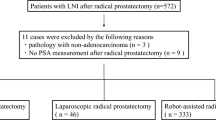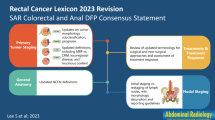Abstract
There was significant controversy about whether lateral lymph node dissection (LLND) should be performed routinely during radical rectal cancer surgery. This study compared total mesorectal excision (TME) with or without LLND in low and middle rectal cancer. Our team retrieved data from Pubmed, EMBASE, Ovid, Web of Science, and the Cochrane Library from their incipience to Oct 1, 2021. We combined the statistics using the survival variables’ hazard ratio (HR). If the article only provided survival curves and delivered no HR value, we used a statistical method to extract logHR and standard errors for data estimation. A total of 33 studies were included in this study (26 cohort studies and 7 randomized controlled trials (RCTs). We found a statistically significant difference in the 5-year postoperative local recurrence rate between LLND + TME group patients (HR = 1.36, 95% CI: 1.07–1.73, p = 0.01); no statistically significant difference in 5-year postoperative overall survival (OS) (HR = 0.95, 95% CI: 0.85–1.06, p = 0.36) and recurrence-free survival (RFS) (HR = 1.13, 95% CI: 0.99–1.29, p = 0.08) between patients in the LLND + TME and TME groups; no statistically significant difference in 5-year OS and RFS between the LLND + TME and TME groups, regardless of preoperative lateral lymph node metastasis (LLNM). LLND + TME was associated with significantly longer operation time (WMD 92.29, 95% CI 82.29–102.28, p < 0.00001), more intraoperative blood loss (WMD 261.31, 95% CI 196.39–326.24, p < 0.00001), higher urinary dysfunction (OR = 2.15, 95% CI 1.16–3.96, P = 0.01), and sexual dysfunction (OR = 6.33, 95% CI 1.73–23.13, P = 0.005). Whereas anastomotic leakage (OR = 1.00, 95% CI 0.54–1.85, p = 0.99) and bowel obstruction (OR = 1.03, 95% CI 0.42–2.54, p = 0.95) were similar between the two groups. LLND did not improve the long-term prognosis of patients with rectal cancer, prolonged the duration of surgery, increased intraoperative bleeding, and led to a higher incidence of postoperative voiding disorders and sexual dysfunction.
















Similar content being viewed by others
Data Availability
All data, models, and code generated or used during the study appear in the submitted article.
References
Gao X, Wang C, Yu YY, Singh D, Yang L, Zhou ZG (2020) Lateral lymph node dissection reduces local recurrence of locally advanced lower rectal cancer in the absence of preoperative neoadjuvant chemoradiotherapy: a systematic review and meta-analysis. World J Surg Oncol 18(1):304
Emile SH, Elfeki H, Shalaby M, Sakr A, Kim NK (2021) Outcome of lateral pelvic lymph node dissection with total mesorectal excision in treatment of rectal cancer: a systematic review and meta-analysis. Surgery 169:1005–1015
Liu Y, Shang L, Zhou CY, Fang Z, Du FY, Wu H et al (2021) Prognostic value of lateral pelvic lymph node dissection for rectal cancer: a meta-analysis. J Surg Res 267:414–423
Parmar MKB, Torri V, Stewart L (1998) Extracting summary statistics to perform meta-analyses of the published literature for survival endpoints. Stat Med 17:2815–2834
Tierney JF, Stewart LA, Ghersi D, Burdett S, Sydes MR (2007) Practical methods for incorporating summary time-to-event data into meta-analysis. Trials 8:16
Nasser M (2020) Cochrane handbook for systematic reviews of interventions. Am J Public Health 110:753–754
Kusters M, van de Velde CJH, Beets-Tan R, Akasu T, Fujida S, Yamamoto S et al (2009) Patterns of local recurrence in rectal cancer: a single-center experience. Ann Surg Oncol 16:289–296
Heald RJ, Husband EM, Ryall RDH (1982) The mesorectum in rectal-cancer surgery - the clue to pelvic recurrence. Br J Surg 69:613–616
Hashiguchi Y, Muro K, Saito Y, Ito Y, Ajioka Y, Hamaguchi T et al (2020) Japanese Society for Cancer of the Colon and Rectum (JSCCR) guidelines 2019 for the treatment of colorectal cancer. Int J Clin Oncol 25:1–42
Gray R, Hills R, Stowe R, Clarke M, Peto R, Buyse M et al (2001) Adjuvant radiotherapy for rectal cancer: a systematic overview of 8507 patients from 22 randomised trials. Lancet 358:1291–1304
Bosset J-F, Collette L, Calais G, Mineur L, Maingon P, Radosevic-Jelic L et al (2006) Chemotherapy with preoperative radiotherapy in rectal cancer. N Engl J Med 355:1114–1123
Takahashi T, Ueno M, Azekura K, Ohta H (2000) Lateral node dissection and total mesorectal excision for rectal cancer. Dis Colon Rectum 43:S59–S68
Fujita S, Mizusawa J, Kanemitsu Y, Ito M, Kinugasa Y, Komori K et al (2017) Mesorectal excision with or without lateral lymph node dissection for clinical stage II/III lower rectal cancer (JCOG0212) a multicenter, randomized controlled, noninferiority trial. Ann Surg 266:201–207
Kanemitsu Y, Komori K, Shida D, Ochiai H, Tsukamoto S, Kinoshita T et al (2017) Potential impact of lateral lymph node dissection (LLND) for low rectal cancer on prognoses and local control: a comparison of 2 high-volume centers in Japan that employ different policies concerning LLND. Surgery 162:303–314
Benson AB III, Venook AP, Al-Hawary MM, Arain MA, Chen Y-J, Ciombor KK et al (2020) Rectal Cancer, Version 6.2020 Featured updates to the NCCN guidelines. J Natl Compr Canc Netw 18:807–15
Sebag-Montefiore D, Stephens RJ, Steele R, Monson J, Grieve R, Khanna S et al (2009) Preoperative radiotherapy versus selective postoperative chemoradiotherapy in patients with rectal cancer (MRC CR07 and NCIC-CTG C016): a multicentre, randomised trial. Lancet 373:811–820
Lin J, Peng J, Qdaisat A, Li L, Chen G, Lu Z et al (2016) Severe weight loss during preoperative chemoradiotherapy compromises survival outcome for patients with locally advanced rectal cancer. J Cancer Res Clin Oncol 142:2551–2560
Morohashi H, Sakamoto Y, Miura T, Ichinohe D, Umemura K, Akaishi T et al (2021) Effective dissection for rectal cancer with lateral lymph node metastasis based on prognostic factors and recurrence type. Int J Colorectal Dis 36:1251–1261
Toritani K, Watanabe J, Suwa Y, Suzuki S, Nakagawa K, Suwa H et al (2019) The risk factors for urinary dysfunction after autonomic nerve-preserving rectal cancer surgery: a multicenter retrospective study at Yokohama Clinical Oncology Group (YCOG1307). Int J Colorectal Dis 34:1697–1703
Hojo K, Vernava AM, Sugihara K, Katumata K (1991) Preservation of urine voiding and sexual function after rectal-cancer surgery. Dis Colon Rectum 34:532–539
van Gijn W, Marijnen CAM, Nagtegaal ID, Kranenbarg EMK, Putter H, Wiggers T et al (2011) Preoperative radiotherapy combined with total mesorectal excision for resectable rectal cancer: 12-year follow-up of the multicentre, randomised controlled TME trial. Lancet Oncol 12:575–582
Saito S, Fujita S, Mizusawa J, Kanemitsu Y, Saito N, Kinugasa Y et al (2016) Male sexual dysfunction after rectal cancer surgery: results of a randomized trial comparing mesorectal excision with and without lateral lymph node dissection for patients with lower rectal cancer: Japan Clinical Oncology Group Study JCOG0212. Ejso 42:1851–1858
Author information
Authors and Affiliations
Corresponding author
Ethics declarations
Conflict of Interests
The authors declare no competing interests.
Additional information
Publisher's Note
Springer Nature remains neutral with regard to jurisdictional claims in published maps and institutional affiliations.
Rights and permissions
Springer Nature or its licensor (e.g. a society or other partner) holds exclusive rights to this article under a publishing agreement with the author(s) or other rightsholder(s); author self-archiving of the accepted manuscript version of this article is solely governed by the terms of such publishing agreement and applicable law.
About this article
Cite this article
Zhou, J., Yuan, X. Lateral Lymph Node Dissection Was Unnecessary for Low and Middle Rectal Cancer: a Systematic Review and Meta-analysis. Indian J Surg 85, 1050–1064 (2023). https://doi.org/10.1007/s12262-022-03632-9
Received:
Accepted:
Published:
Issue Date:
DOI: https://doi.org/10.1007/s12262-022-03632-9




